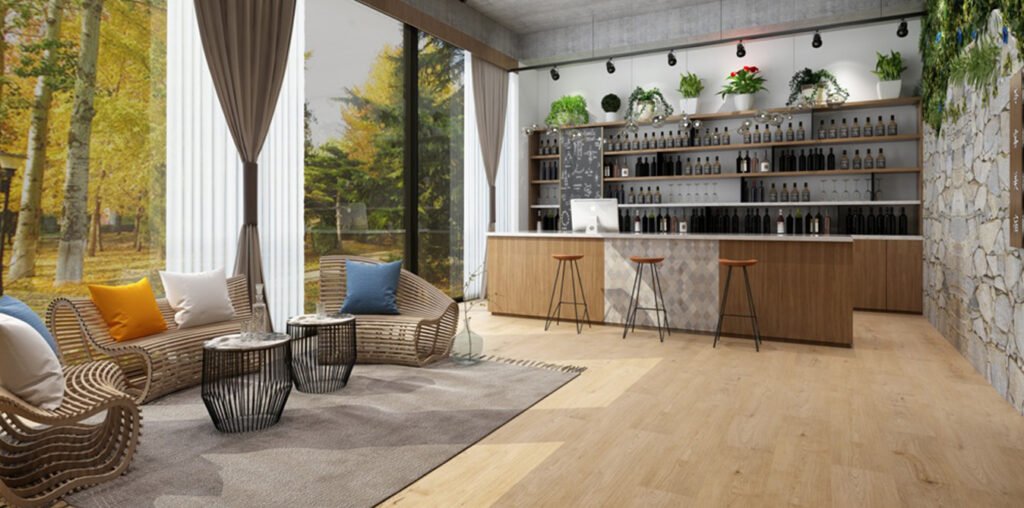Renovating a home has never been an acronym-free activity. From GFCI to CFL to VOC, there are all sorts of three- and four-letter terms that homeowners need to know to make smart decisions throughout the remodeling process.
Choosing your flooring is no different! Thanks to today’s masterfully engineered luxury vinyl flooring options, it’s hard to go wrong. Still, we believe it’s important for buyers to come into the process knowing exactly the right flooring material for their situation—and that means becoming familiar with a few flooring acronyms.
Interested in installing ultra-durable vinyl plank flooring, rigid core flooring or waterproof and water-resistant flooring? Then you need to know the differences between the WPC and SPC construction terms before you begin your color and design selection.
What Is Rigid Core Flooring?
Rigid core flooring is the innovative vinyl flooring for today’s demanding consumers. Available in both plank and tile shapes, it’s a luxury material that can stand up to a lot of abuse, including water.
To understand rigid core, you have to move beyond the vinyl flooring you’re familiar with. Standard vinyl flooring is a fairly thin, flexible material that is glued down to the sub floor. Rigid core is stiffer, thicker and sturdier, which gives it some unique advantages. One of its most-hyped pluses is its ability to handle water, but that’s not the only check in the “pro” column. It can also handle sub floor imperfections, offer excellent sound insulation and superior comfort underfoot.
Here’s where we get to the technical jargon: The assorted positives of vinyl plank flooring (or vinyl tile) depend on whether you go with a WPC or SPC construction.
How WPC and SPC Come into Play
Like engineered hardwood, luxury vinyl plank flooring is constructed from layers of material—typically four, though that can vary between manufacturers. Let’s look at the different layers, starting with the surface:
Layer #1 is the wear layer. It’s clear, durable and scratch-resistant.
Layer #2 is the vinyl layer, composed of multiple, compressed layers of vinyl. This layer facilitates the authentic embossing technology applied to the printed decorative film that lies between the wear layer and this vinyl layer.
Layer #3 is the rigid core layer. It’s made from either wood plastic composite (WPC) or stone plastic composite, also referred to as a solid polymer core (SPC).
Layer #4 is the base layer. This is the bottom of your plank or tile, and it’s usually made from foam or cork.
Many WPC and SPC options also feature an attached pad (underlayment) that provides sound absorption and allows for under floor heating systems.
What Is WPC?
Wood plastic composite flooring, or WPC flooring, is a vinyl plank or vinyl tile flooring with a rigid core that’s made from either recycled wood pulp and plastic or polymer composites that are expanded with air. It’s sometimes called “wood polymer composite flooring.” It is a light weight, low density construction that is warm and soft underfoot with greater comfort.
What Is SPC?
Stone plastic composite, solid polymer core, or SPC flooring, is a vinyl flooring material that has a rigid core made from powdered limestone, polyvinyl chloride and stabilizers. Sometimes, you might see it referred to as “stone polymer composite flooring.” It is dense, dimensionally stable, quiet and strong. Pure from Beauflor are great options in this category and both include an attached pad.
What Are the Major Differences Between WPC and SPC Vinyl Flooring?
Both WPC and SPC flooring are water resistant and incredibly durable to wear caused by high traffic, incidental scratches and everyday life. The essential difference between WPC and SPC flooring comes down to the density of that rigid core layer.
Stone is denser than wood, which sounds more confusing than it really is. As a shopper, all you need to do is think about the difference between a tree and a rock. Which has more give? The tree. Which can handle a heavy impact? The rock.
Here’s how that translates to flooring:
WPC consists of a rigid core layer that is thicker and lighter than the SPC core. It is softer underfoot, which makes it comfortable to stand or walk on for longer periods of time. Its thickness can give it a warmer feel and it is good at absorbing sound.
SPC consists of a rigid core layer that’s thinner and more compact and dense than WPC. This compactness makes it less likely to expand or contract during extreme temperature swings, which can improve the stability and longevity of your flooring. It’s also more durable when it comes to impact.
When to Choose WPC or SPC Flooring for your Home
Depending on where you plan to lay your new flooring, selecting the correct construction can make a big difference. Here are some common situations where it makes sense to choose one type of flooring over the other:
Making living space on a second level, over an unheated area, such as a basement? Go with WPC, which will better insulate your rooms. Choose a WPC with an attached pad for added warmth, such as Palmetto Road Tidewater Collection.
Building a home gym? Choose SPC so that you don’t have to worry about dropping weights. Finishing a sun room? SPC will fare better in spaces that are not heated or cooled, like three-season rooms. Impact and Inspire waterproof SPC from Palmetto Road are great options.
Creating a workshop? If you’ll be standing for a long time, WPC will be more comfortable. If you’re worried about dropped tools creating dents, SPC will give you better peace of mind.
Renovating a multi-level home? WPC will help keep sound spillage from floor to floor to a minimum. Again, there are many options with an attached pad for added sound absorption.
Waterproof Flooring: Things to Keep in Mind
While you’re looking at luxury vinyl plank and vinyl tile options, you’re likely to come across lots of waterproof flooring options as well. While WPC and SPC flooring are water-resistant, you still need to care and maintain these types of flooring properly in order to get the most use out of them.
What the term ‘waterproof flooring’ means is that these floors hold up well to spills and splashes. You should never let water (or any other liquid) pool or collect on your floors, no matter what they’re made of. This can cause permanent damage and, in some cases, it can void your flooring warranty. Your best bet is to always clean up water quickly and to solve structural problems causing leaks or puddling ASAP.
Pro Tip: Consult with an experienced flooring professional to help you find quality waterproof flooring that best fits your needs.


